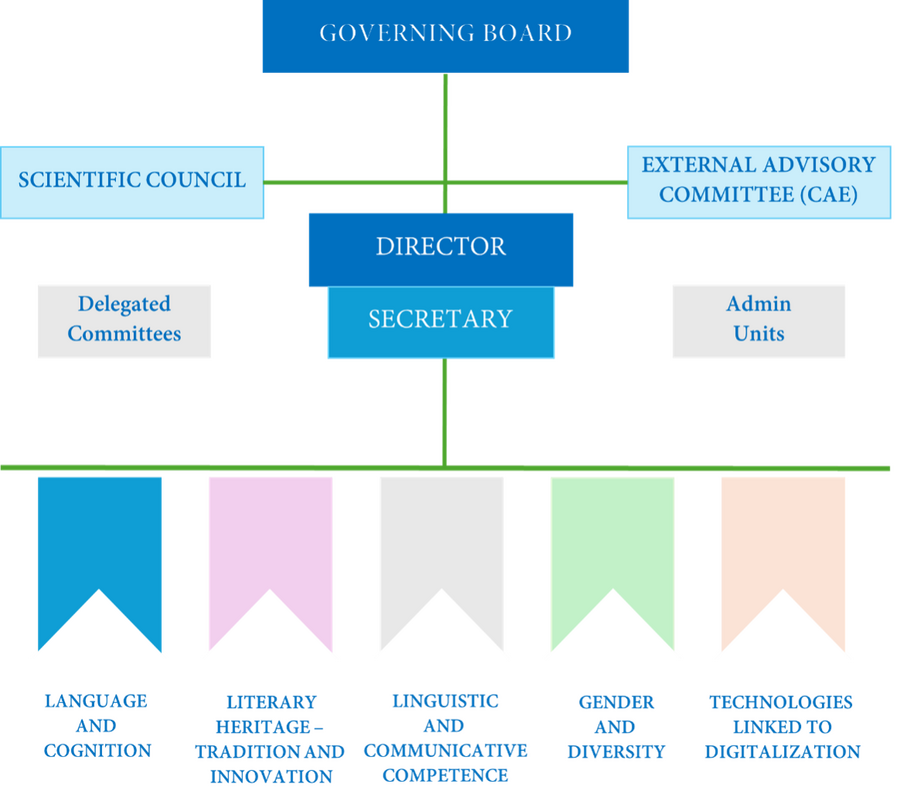Organizational Structure, Composition, and Function
Antonio López Díaz, Rector of the University of Santiago de Compostela (Chair)
Mª Pilar Bermejo Barrera, Vice-Rector for Scientific Policy, USC
Tomás S. Cuesta García, representative of the USC Governing Council
Representative of the USC Social Council
María José Alonso Veloso, Director of the Institute
Tamara Bouso Rivas, Secretary of the Institute
Functions of the Governing Board
- Approve the appointment of the Institute’s Director, upon proposal by the Scientific Council and with prior favourable opinion from the External Advisory Committee (Sp. CAE).
- Approve the removal of the Director, upon proposal by an absolute majority of the Scientific Council.
- Approve the Institute’s budget proposals and programming.
- Approve the Institute’s annual activity and financial reports and report them to the USC Governing Council.
- Promote funding and resourcing for the Institute.
- Appoint the External Advisory Committee as provided for in the Bylaws and establish its operating procedures.
- Ratify proposals for the admission of new members and approve their disassociation.
- Propose amendments to the Bylaws to the USC Governing Council.
María José Alonso Veloso (Director)
Tamara Bouso Rivas (Secretary)
Six members of teaching and research staff (PDI), representing the main research areas defined in the Institute’s research agenda
One representative of non-tenured research staff
One representative of predoctoral researchers affiliated with the Institute
Representatives are elected by direct vote within each respective group, except PDI members, who are elected by research area or clusters thereof.
Functions of the Scientific Council
- Propose the appointment of the Director to the Governing Board.
- Approve the admission of new academic staff, subject to a prior report from the CAE. Admissions must be ratified by the Governing Board.
- Propose the disassociation of academic or research staff to the Governing Board, with prior input from the CAE where applicable.
- Advise on programme proposals, budgets, financial reports, and activity reports.
- Plan and monitor the Institute’s research, teaching, and technical advisory activities.
- Provide input on contracts entered into by the Institute and its members
Director: María José Alonso Veloso
Secretary: Tamara Bouso Rivas
Functions of the Management Team
- Convene and preside over the Scientific Council, execute its decisions, and oversee the Institute’s day-to-day management.
- Represent the Institute within its area of competence.
- Draft budget proposals and activity programming.
- Prepare annual activity and financial reports.
- Propose the appointment of the Secretary to the Rector.
- Authorize expenditures from the annual budget.
María del Pilar García Mayo, Professor of English Philology, University of the Basque Country (UPV-EHU), Spain
María del Carmen González Vázquez, Professor of Classical Philology, Autonomous University of Madrid, Spain
Francisco Javier Martín Arista, Professor of English Philology, University of La Rioja, Spain
Francisco Moreno Fernández, Professor of Spanish Language, University of Alcalá, Spain / Alexander von Humboldt Chair, University of Heidelberg, Germany
Juan Miguel Valero Moreno, Professor of Romance Philology, University of Salamanca, Spain
Functions of the External Advisory Committee
- Advise the Director and Governing Board on any matter related to the Institute’s operations and research agenda.
- Periodically evaluate the Institute’s activities and those of its researchers and issue corresponding assessment reports.
- Assess applications for new member affiliations.
- Provide input on the appointment of unit coordinators, where applicable.
- Evaluate the Institute’s four-year action plan.
Training and Outreach
Talent
Knowledge Transfer
Gender Equality
